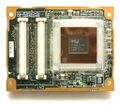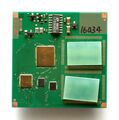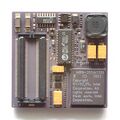Engineering:Notebook processor
A notebook processor is a CPU optimized for laptops.
One of the main characteristics differentiating notebook processors from other CPUs is low-power consumption, however, they are not without tradeoffs; they also tend to not perform as well as their desktop counterparts. [1]
The notebook processor has become an important market segment in the semiconductor industry. Notebook computers are a popular format of the broader category of mobile computers. The objective of a notebook computer is to provide the performance and functionality of a desktop computer in a portable size and weight.
Cell phones and PDAs use "system on a chip" integrated circuits that use less power than most notebook processors.
While it is possible to use desktop processors in laptops, this practice is generally not recommended, as desktop processors heat faster than notebook processors and drain batteries faster.
Models
Current
- ARM architecture (used in Chromebooks, Windows 10 laptops, Linux netbooks and recent Macs)
- Apple M series
- MediaTek
- Nvidia: Tegra
- Qualcomm: Snapdragon
- Rockchip
- Samsung Electronics: Exynos
- x86
Former
- PowerPC
- Motorola and Freescale Semiconductor made PowerPC G4 processors for the pre-Intel Apple Computer notebooks.
- x86
Image gallery
-
Intel Mobile Pentium MMX 300 MHz
-
Rare Fujitsu Pentium 100 MHz for Notebooks
-
Rare Fujitsu Pentium 150 MHz for Notebooks
See also
- Computer architecture
- Microprocessor
- Personal computing
References



